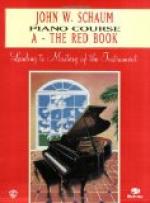BOOKS THAT ARE HELPFUL
“As aids to my studies in the art of teaching, several books have been most helpful. Among these are two volumes by Dr. Herman H. Home, The Philosophy of Education, and The Psychology of Education. Another book, from which I have profited much is William James’ Talks to Teachers on Psychology. Every teacher should possess it.
“You ask what method I pursue with new pupils who have played a great deal of music but with little idea of correct principles of piano study. Let us take, for instance, one who has had lessons for years but is in ignorance of first principles. Arms and wrists are stiff, hands and fingers held in cramped position; no freedom anywhere. My first move is to have the pupil stand and learn to relax arms, shoulders and body; then learn to breathe. But relaxation, even at first, is not the only thing; after devitalization comes organization, firmness and solidity—in the right places. It must be understood at the very beginning that piano playing is far more than sitting before the instrument working the fingers six or seven hours a day. The mechanical side is only preliminary. Some one has said that the factors in playing are a trinity of H’s—head, hand and heart. I try at once to awaken thought, to give a wider outlook, to show that piano playing is the expression, through the medium of tone, of all that the poet, painter and philosopher are endeavoring to show through other means: to this end I endeavor to stimulate interest in the wonders of the visible universe, the intellectual achievements of men and the deep things of spiritual discernment.
IN REGARD TO INTERPRETATION
“On this subject I think we should avoid pedantry; not to say to the pupil, you must play this piece a certain way; but rather say, I see or feel it in this way, and give the reasons underlying the conception. I believe the successful teacher should be a pianist. He should understand every point and be able to do the thing, else how can he really show the manner of the doing? Many of the nuances, subtleties of color and phrase, effects of charm or of bravura, cannot be explained; they must be illustrated. And furthermore, only he who has been over the road can be a safe or sympathetic guide. Tolstoi realized he could not be of service to the people he would uplift unless he lived among them, shared their trials and experienced their needs. The time has gone by when the musician and composer was considered a sort of freak, knowing music and nothing else. We know the great composers were men of the highest intelligence and learning, men whose aim was to work out their genius to the utmost perfection. Nothing less than the highest would satisfy them. As George Eliot said, ’Genius is the capacity for taking infinite pains.’ Think of the care Beethoven took with every phrase, how many times he did it over, never leaving it till he was satisfied.”




